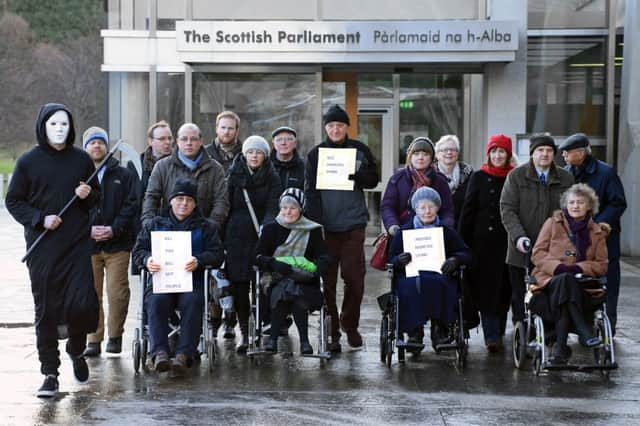Assisted dying needs clarity in the courts, says poll


Several public opinion polls have found that around two-thirds of Scots are in favour of some form of assisted dying legislation being introduced.
A Populus poll in March found as many as 83 per cent of Scots backed an assisted dying law. This was up from 69 per cent who were in favour when asked in January 2014 for a survey by Progressive Scottish Opinion.
Advertisement
Hide AdAdvertisement
Hide AdAssisted suicide is legal by different degrees in five countries: Belgium, the Netherlands, Canada, Colombia and Switzerland.


Four US states - California, Oregon, Vermont and Washington - also either passed assisted suicide laws or do not prosecute those who choose it. It was briefly legal in New Mexico until a district court ruling was overturned on appeal in August.
MSPs rejected the Assisted Suicide Scotland Bill by 82 votes to 36 following a debate at Holyrood in March. The bill was originally introduced by the late Margo MacDonald, who died in 2014 following a long battle with Parkinson’s disease.
Her cause was then taken up by Scottish Greens leader, Patrick Harvie.
MSPs were given a free vote on the issue. Supporters argued the issue needed greater clarity in law and was supported by a majority of the public.
It is not illegal to attempt suicide in Scotland; however assisting someone to take their own life could lead to prosecution.
Opponents argued the legislation was flawed and would be unethical.
Harvie said it had been “a great honour” to introduce the bill and said it retained public support despite being voted down.
Advertisement
Hide AdAdvertisement
Hide Ad“It’s unlikely that the vote last May marks the end of the debate.
“Those who voted against the Assisted Suicide Bill held a number of concerns over the potential impact of the right to die - perhaps the most significant is the perception that people would come under pressure to choose assisted suicide against their will. While I’m convinced that these concerns can be fully addressed, it’s clear that more discussion must be had to reassure many of the merits of allowing people to make their own choice.
“It’s crucial that decisions on assisted suicide aren’t rushed, but it’s equally important that we don’t shy away from a constructive, well-informed debate on an issue that has such a profound impact on people’s ability to maintain control over their lives.”
The medical profession is split on the issue. The British Medical Association (BMA) is firmly opposed while the Royal College of Nursing takes a neutral stance.
A spokesman for BMA Scotland said: “There are strongly held views within the medical profession on both sides of this complex and emotive issue which has been regularly debated at the BMA’s policy-forming annual conference where recent calls for a change in the law have been rejected by the BMA.”
Care Not Killing Scotland, a campaign group which promotes palliative care and opposes euthanasia, said legalising assisted suicide would put pressure on the vulnerable and the right to die would “very quickly become the duty to die”.
“In the last five years alone, Holyrood has decisively rejected assisted suicide on two occasions,” said convenor Gordon Macdonald.
“There is clearly little political appetite up here to reopen this debate. With Westminster overwhelmingly rejecting assisted suicide just a few months ago as well, repeated attempts to liberalise the law are a waste of time, money and energy that could be spent improving palliative care for those at the end of their lives.”
Advertisement
Hide AdAdvertisement
Hide AdCampaigners for assisted dying are now calling on the Lord Advocate to issue prosecution guidance on the issue.
Scotland is currently the only legal jurisdiction in the UK not to issue guidance to judges on those convicted of helping someone to commit suicide.
Gordon Ross, a former treasurer of the Humanist Society of Scotland, unsuccessfully tried to force a judicial review of the matter in September.
“I have no wish to end my own life and hope I never do reach that point. However, this decision will mean that, if someone has a degenerative condition which might lead them to one day lose the ability to take their own life, they may now choose to do so earlier whilst they still have the capacity rather than put a friend or family member at risk of prosecution by waiting until they might require assistance.”
A spokesman for the Crown Office said: “The Lord Advocate does not intend to issue prosecutorial guidance on assisted suicide.
“The Crown’s position on assisted suicide has been made clear. There is no such law in Scotland and anyone who assists someone to die will be dealt with under the law of homicide which is clear and accessible.
“A prosecution will be raised if there is a sufficiency of evidence and it is in the public interest to do so. The Lord Advocate made this clear in a letter to the Justice Committee.
“The Crown applies the law but does not make laws. Prosecutorial policy cannot be used as a means of changing the law.
“Legislation is a matter for the Scottish Parliament.”